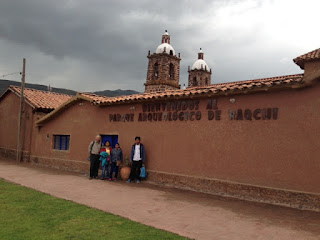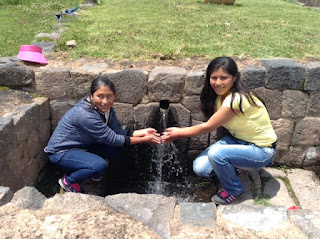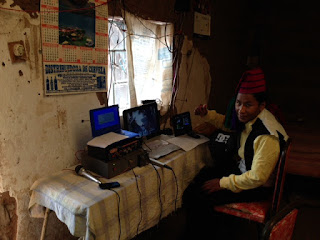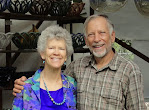A solar project with heart
When Paonia potters Sam Brown and Tara Miller married in the mid-1980s, they imagined selling their handmade pottery and living a simple life. She was educated in literature, he had a background in zoology, natural resources and recreation, and they shared a desire to visit the world's great mountain regions. "We live in Colorado," said Sam. "We love mountains."
In 1986 they took their first trip, to Peru and the Andes Mountains. The trip changed the course of their lives, and in turn, changed the lives of others.
In the 1970s, Tara enrolled in an evening pottery class while teaching high school English in Coos Bay, Ore. Soon after, she took a year off and focused on her pottery skills. In the early 1980s she moved to Aspen to make picture frames for her photographer sister, and in 1982, began working solely in the pottery studio, studying under some of the biggest names in the field.
Her specialty was heavy ceramic mugs decorated with aspen leaves applied through a resist technique. They sold quite well in the local shops. In 1983, Tara met Sam, a National Parks Service back-country ranger stationed at Rocky Mountain National Park. Shortly after, he took off on a year-long assignment to Alaska, returned to Aspen, and joined Tara in the clay studio.
Sam added Rocky Mountain themes like elk, native birds, aspen trees, fishermen and skiers to Tara's motifs. Themes they continue to use today. "Our pottery sells well as long as we stay within the Rocky Mountain theme," said Sam.
Their trip to Peru took them to Lake Titicaca, located at almost 12,500 feet at the base of the Andes Mountains. A two-hour boat ride from the city of Puno took them to Taquile Island.
A terraced island of just over two square miles, Taquile's economy is based on agriculture and tourism. It has largely avoided outside influences for centuries. As a result, said Sam, there are no cars, bicycles, dogs or guns on the island. As they have been for centuries, major decisions are made collectively. Recently the residents thwarted efforts to commercialize and build hotels.
"It's a real peaceful society," said Sam. "You walk everywhere."
Taquile is known worldwide for its fine textiles, made using centuries-old knitting and weaving techniques, and from which their colorful and traditional clothing is made. In 2005, Taquile's textile arts were proclaimed "Masterpieces of the Oral and Intangible Heritage of Humanity" by UNESCO.
Most tourists stay a couple of hours, take photos and buy textiles before heading back to Puno. Sam and Tara planned to stay two nights and were assigned a host family.
One modern technology only beginning to be introduced in the region was solar power, but it was unknown on Taquile Island. What little power they had came from lead-acid batteries. Charging them meant a three-day round trip to Puno. Tara and Sam knew about solar power both through association with the Rocky Mountain Institute and through a new renewable energy program at Colorado Mountain College in Aspen, which in 1991 would morph into Solar Energy International. The environmental risks of the lead-acid batteries were a big concern, they said.
Their host couple were weavers. They showed Sam and Tara their beautiful textiles and shared their dream of going to America to sell their goods and teach their craft.
"Being craftspeople ourselves, we bought into the dream," said Tara. Their two-night stay turned into a week. In 1988, they returned, smuggling in a 9-watt solar panel. They wired the panel to a radio and played music. To the residents, "It was like magic," said Sam.
Everyone wanted a panel, they said. They traded the panel for textiles, which they sold back home at local craft fairs, and re-invested the money in more solar panels to take with them on their next trip.
Taquile's inhabitants gained more than solar power, they gained a family. On Taquile, says Tara, "We're 'Madrina and Padrino,'" Godmother and Godfather.
Tara and Sam moved to Paonia in the early 1990s and set up their clay studio. It hasn't made them rich, but that was never the plan, they said. Tara began ceramic mugs, platters, bowls, planters, and other objects, and Sam made clay coil stoneware fruit/bread baskets. They were busy with family life, and in winters sold Christmas trees in California for Sam's family's business.
In the mid-1990s they returned to their Taquile family, and have returned almost every year, always packing solar equipment for trade. Back home, they sold textiles alongside their pottery. "We figure that was their currency because it's good stuff," said Sam. Since they only need to make enough to buy more solar equipment, the markup is small. Items sell well, and people who know weaving recognize the fine detail of the weaving and understand the skills required to make it.
Through the years Sam and Tara have also brought Taquile residents to America. One year the Smithsonian Institution hosted a group of Taquile residents. The Smithsonian paid their expenses, but when offered money, "They wanted solar panels," said Sam. "The Smithsonian had to run around and buy solar panels to pay them."
SEI moved from Carbondale to Paonia in 2002. When they offered a class on solar energy in the developing world, Tara and Sam gave a lecture on Taquile. Most lectures were filled with technical speak, they said. They spoke about smuggling solar panels into Peru, trading panels for textiles, and how much they loved the people. "We were the project with heart," said Tara.
 |
Sam shares a happy moment with three young sisters on Taquile Island, Lake Titicaca, Peru, where he and wife Tara are known as ‘Madrina and Padrino,’ Godmother and Godfather.
|
Tara and Sam are still living simply and making pottery in the home studio. At the height of their career, they did as many as 12 craft shows a year. They could have had more lucrative careers, but instead made a conscious choice to maintain control of their lives. They wanted the flexibility that allows them to hike or travel and work in their studio. "We knew we were choosing the lower money route, but we were choosing a quality of life, other than a 9-to-5 job," said Sam.
After more than 30 years, they're cutting back on craft fairs and slowing production. They plan to create more local venues and set up shop online. The demand is still there, said Tara. She recently enlisted the help of an assistant to work in the studio.
They also plan to continue visiting their Taquile family. They recently established a program to provide school supplies to the local children. Two years ago, Brad Burritt and Danielle Carre with Empowered Energy Systems in Hotchkiss traveled to Taquile to install two small solar systems. Through a YouCaring campaign, they raised money and returned last year with son Asa, a solar installer who speaks Spanish, to teach a solar installation class. Four Taquile residents earned their diplomas and now have textbooks to refer to.
Their positive influence on the island continues. Recently their godson was re-elected to town council. When a diesel fired water-pumping project was proposed, which would belch diesel smoke and not bode well with the tourists, he lobbied for solar, and won. Thanks to the resulting project, the island now has three water pumping systems, virtually eliminating the need to haul water.
Hauling water, said Sam, is considered one of the biggest jobs in the developing world. On one trip to Taquile they had to haul water, and almost cried when they got home and turned on the faucet. "It's so amazing that we have running water, both temperatures, and it's clean," said Tara.
On their most recent trip, they brought home dozens of textiles -- hats, gloves, scarves, belts and purses. Some pieces are tagged with the artist's name, type of wool used, and a short story. As they have for many years, this Friday and Saturday they will have a booth at the annual Holiday Art Fair at the Blue Sage Center for the Arts in Paonia.
Their years of work and visits to Taquile Island are documented in words and photographs at taquilefriends.blogspot.com.
###


























































